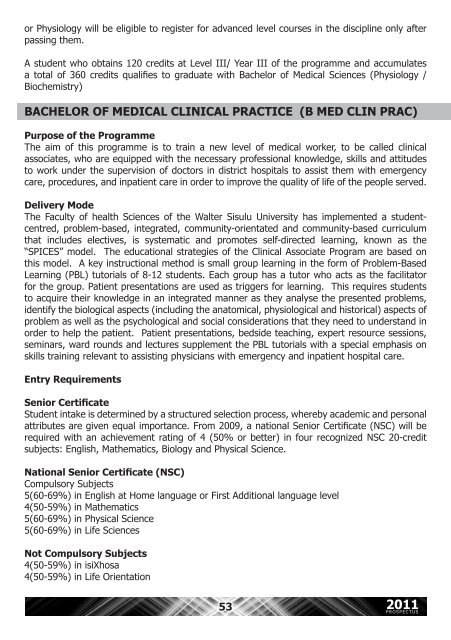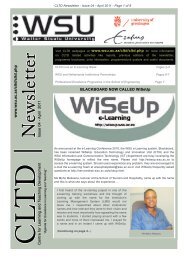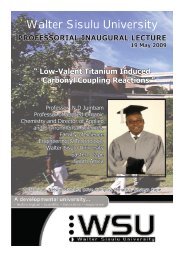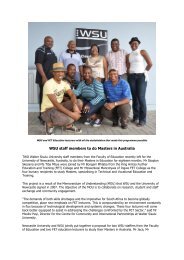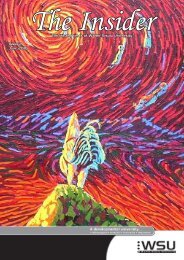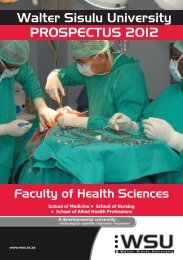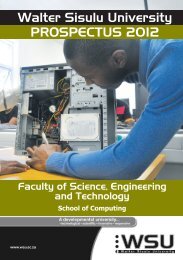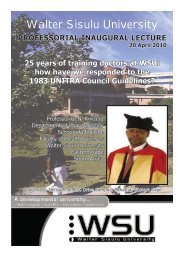important senate notice - Walter Sisulu University
important senate notice - Walter Sisulu University
important senate notice - Walter Sisulu University
You also want an ePaper? Increase the reach of your titles
YUMPU automatically turns print PDFs into web optimized ePapers that Google loves.
or Physiology will be eligible to register for advanced level courses in the discipline only after<br />
passing them.<br />
A student who obtains 120 credits at Level III/ Year III of the programme and accumulates<br />
a total of 360 credits qualifies to graduate with Bachelor of Medical Sciences (Physiology /<br />
Biochemistry)<br />
BACHELOR OF MEDICAL CLINICAL PRACTICE (B MED CLIN PRAC)<br />
Purpose of the Programme<br />
The aim of this programme is to train a new level of medical worker, to be called clinical<br />
associates, who are equipped with the necessary professional knowledge, skills and attitudes<br />
to work under the supervision of doctors in district hospitals to assist them with emergency<br />
care, procedures, and inpatient care in order to improve the quality of life of the people served.<br />
Delivery Mode<br />
The Faculty of health Sciences of the <strong>Walter</strong> <strong>Sisulu</strong> <strong>University</strong> has implemented a studentcentred,<br />
problem-based, integrated, community-orientated and community-based curriculum<br />
that includes electives, is systematic and promotes self-directed learning, known as the<br />
“SPICES” model. The educational strategies of the Clinical Associate Program are based on<br />
this model. A key instructional method is small group learning in the form of Problem-Based<br />
Learning (PBL) tutorials of 8-12 students. Each group has a tutor who acts as the facilitator<br />
for the group. Patient presentations are used as triggers for learning. This requires students<br />
to acquire their knowledge in an integrated manner as they analyse the presented problems,<br />
identify the biological aspects (including the anatomical, physiological and historical) aspects of<br />
problem as well as the psychological and social considerations that they need to understand in<br />
order to help the patient. Patient presentations, bedside teaching, expert resource sessions,<br />
seminars, ward rounds and lectures supplement the PBL tutorials with a special emphasis on<br />
skills training relevant to assisting physicians with emergency and inpatient hospital care.<br />
Entry Requirements<br />
Senior Certificate<br />
Student intake is determined by a structured selection process, whereby academic and personal<br />
attributes are given equal importance. From 2009, a national Senior Certificate (NSC) will be<br />
required with an achievement rating of 4 (50% or better) in four recognized NSC 20-credit<br />
subjects: English, Mathematics, Biology and Physical Science.<br />
National Senior Certificate (NSC)<br />
Compulsory Subjects<br />
5(60-69%) in English at Home language or First Additional language level<br />
4(50-59%) in Mathematics<br />
5(60-69%) in Physical Science<br />
5(60-69%) in Life Sciences<br />
Not Compulsory Subjects<br />
4(50-59%) in isiXhosa<br />
4(50-59%) in Life Orientation<br />
53<br />
2011<br />
P R O S P E C T U S


